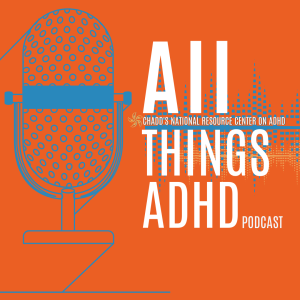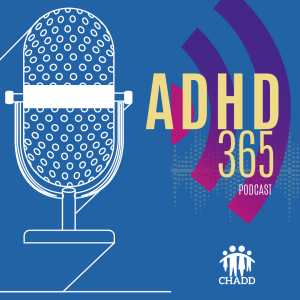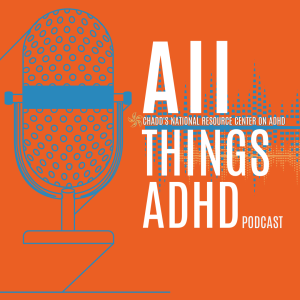Episodes

Thursday Oct 28, 2021
Becoming an Adult and Managing ADHD
Thursday Oct 28, 2021
Thursday Oct 28, 2021
Please let us know what you think of this podcast by taking a short, anonymous survey. We value your feedback and will use it to create podcasts that are helpful to you.
Are you a parent of a teen or a teenager who’s transitioning into adulthood? Well, this episode of the All Things ADHD podcast is for you. We gave our mic over to guest host Liam Tolbert, a teenager who is managing ADHD and learning to be independent. Many teens with ADHD may find emerging into adulthood stressful, frustrating, and challenging since most of their life has been supervised by a parent, teacher, or caregiver. Tolbert speaks with Dr. Eugene Arnold, CHADD’s resident expert, about ADHD healthcare responsibilities young adults need to know, understanding and managing symptoms to help individuals succeed, and overcoming barriers to accessing good healthcare.

Thursday Oct 14, 2021
Creencias culturales y el manejo del TDAH en familias latinas
Thursday Oct 14, 2021
Thursday Oct 14, 2021
Descripción:Los padres latinos muchas veces están navegando por aguas difíciles cuando se trata de proporcionar apoyo a sus hijos que tienen TDAH. Muchos padres tienen conexiones fuertes con su cultura y relaciones con amigos y familiares que no están familiarizados con el diagnóstico de TDAH. Las escuelas muchas veces luchan con su diferenciación entre lo que es el TDAH y un problema cultural, disciplinario, familiar o problemas de hablar y el lenguaje. Aumentar la comprensión y el empoderamiento de los padres es un primer paso fundamental para ayudar a los jóvenes latinos con TDAH a prosperar en el hogar y la escuela.Objetivos:1. Identificar las suposiciones y entendimientos comunes que tienen los padres latinos sobre el TDAH.2. Describir las formas en que las escuelas malinterpretan los síntomas del TDAH en los jóvenes latinos.3. Nombrar formas clave en las que los padres y las escuelas pueden trabajar juntos para promover la comprensión, la empatía y la colaboración.

Tuesday Oct 05, 2021
Women in Midlife and ADHD
Tuesday Oct 05, 2021
Tuesday Oct 05, 2021
Many women struggle at midlife with undiagnosed and untreated ADHD complicated by hormonal changes. They typically report feeling overwhelmed, inadequate, misunderstood, and distressed at a time in their lives when they often have the greatest demands on their time and energy. Women not diagnosed with ADHD until adulthood are more likely to suffer from depressive symptoms, anxiety, sleep disorders, eating disorders, substance use, and low self-esteem.
In this episode, Dr. Carol Robbins provides an understanding of the challenges women face in midlife with ADHD, coping strategies, and the importance of reaching out when help is needed.
Read more about women in midlife and ADHD.
Carol Ann Robbins, PhD, is a licensed clinical psychologist specializing in the diagnosis and treatment of ADHD across the lifespan. She is the clinical director of the Annapolis ADHD Center and works with Kathleen Nadeau, PhD, an internationally known expert on ADHD, at the Chesapeake ADHD Center of Maryland. Dr. Robbins is a seasoned speaker, presenter, and author, as well as past president of the Maryland Psychological Association and coordinator of the MPA Post-Doctoral Institute on ADHD Across the Lifespan. She has served as coordinator of the Anne Arundel County chapter of CHADD since 2002.

Friday Sep 17, 2021
ADHD and the Struggle with Suicidal Ideation
Friday Sep 17, 2021
Friday Sep 17, 2021
ADHD impairments are made worse for many individuals by their struggles with excessive anxiety, persistent depression, compulsive behaviors, difficulties with mood regulation, or other coexisting disorders that persistently disrupt their daily lives. Sometimes this could lead a person struggling with their ADHD down a dark road to contemplating suicide.
Talking about suicide, suicidal ideation, and self-harm with a loved one you suspect has these feelings can be challenging. Dr. Roberto Olivardia talks with Susan Buningh about the risk factors in children and adults who have ADHD, warning signs, and preventive measures to help someone you think may be considering self-harm or suicide.
Dr. Roberto Olivardia is a clinical psychologist and lecturer in the department of psychiatry at Harvard Medical School. He maintains a private psychotherapy practice in Lexington, Massachusetts, where he specializes in the treatment of ADHD, executive functioning issues, and students with learning differences. He also specializes in the treatment of body dysmorphic disorder, obsessive-compulsive disorder, and eating disorders in boys and men. He currently serves on the professional advisory boards for CHADD, ADDA, and the National Association for Males with Eating Disorders.

Tuesday Sep 14, 2021
Latino Culture and ADHD Treatment
Tuesday Sep 14, 2021
Tuesday Sep 14, 2021
ADHD is found in all communities. For Latinos, cultural norms and barriers to healthcare affect the perception of ADHD symptoms in children, which may go unnoticed or undiagnosed. What are some of the cultural barriers to ADHD treatment? How can cultural beliefs affect treatment for ADHD? Dr. Lauren Haack will discuss common symptoms of ADHD and its presence in the Latino population. In addition, she gives insight into important cultural considerations professionals need to be aware of when treating Latinos with ADHD. She will also discuss how gender roles and family values may influence decisions about treatment options.
Lauren Haack, PhD, is an assistant professor and attending psychologist in the department of psychiatry at the University of California, San Francisco. Her research program and clinical practice focus on accessible and culturally attuned evidence-based services for vulnerable youth and families, with a particular specialty in ADHD services for children in Spanish-speaking, Latinx families.

Tuesday Aug 31, 2021
Adult ADHD and Suicide Prevention
Tuesday Aug 31, 2021
Tuesday Aug 31, 2021
The death of someone you love is often met with sadness. But the heartache felt by family members and friends can become more confusing and unnerving when the cause of death is suicide. Researchers say adults with ADHD have a high prevalence of attempted suicide. But is there a direct link between ADHD and suicide? What other risk factors are involved? Dr. Jill Harkavy-Friedman shares insight and understanding of risk factors and other conditions that often coexist with ADHD, increasing suicidal thoughts and attempts. She also discusses warning signals, preventive measures, and the approach to take if faced with someone expressing suicidal ideation.
Jill Harkavy-Friedman, PhD, is vice president of research at the American Foundation for Suicide Prevention. She works with over 200 scientific advisors to evaluate progress in the field and chart the next areas of inquiry to yield impactful insights and strategies for suicide prevention. Dr. Harkavy-Friedman has published over 100 articles. She works closely with AFSP’s education, communication, and public policy and advocacy teams to develop programs and messages to ensure they follow best practices in suicide prevention and reflect the latest findings in research. She earned her bachelor’s degree in psychology at the University of Pennsylvania and her master’s degree and doctorate in clinical psychology at the University of Florida. In 1984, she joined Montefiore Medical Center/Albert Einstein College of Medicine as an assistant professor. She established the Adolescent Depression and Suicide Program. In 1989, Dr. Harkavy-Friedman moved to Columbia University/New York State Psychiatric Institute, first as an assistant professor and later as an associate professor of clinical psychology in psychiatry. As a licensed psychologist, she maintains a clinical practice in Manhattan.

Friday Aug 27, 2021
Teens, ADHD, and Suicide
Friday Aug 27, 2021
Friday Aug 27, 2021
Children and teenagers are more exposed than ever due to social media. They share what they are doing in real-time. As a result, experts say kids are growing up with more anxiety and less self-esteem. For parents, knowing what their child or teen is thinking and feeling becomes even more challenging. So, when do the usual ups and downs of a child with ADHD become something to worry over? What if your teen is thinking about suicide? Do you know the warning signs? In this episode, Dr. Jill Harkavy-Friedman talks about the warning signs for parents to watch for in their children. Also, she provides strategies for talking to your child and teen about suicide, building a support network, and preventive measures.
Jill Harkavy-Friedman, PhD, is vice president of research at the American Foundation for Suicide Prevention. She works with over 200 scientific advisors to evaluate progress in the field and chart the next areas of inquiry to yield impactful insights and strategies for suicide prevention. Dr. Harkavy-Friedman has published over 100 articles. She works closely with AFSP’s education, communication, and public policy and advocacy teams to develop programs and messages to ensure they follow best practices in suicide prevention and reflect the latest findings in research. She earned her bachelor’s degree in psychology at the University of Pennsylvania and her master’s degree and doctorate in clinical psychology at the University of Florida. In 1984, she joined Montefiore Medical Center/Albert Einstein College of Medicine as an assistant professor. She established the Adolescent Depression and Suicide Program. In 1989, Dr. Harkavy-Friedman moved to Columbia University/New York State Psychiatric Institute, first as an assistant professor and later as an associate professor of clinical psychology in psychiatry. As a licensed psychologist, she maintains a clinical practice in Manhattan.

Tuesday Aug 03, 2021
Is Your Teen with ADHD College-Ready?
Tuesday Aug 03, 2021
Tuesday Aug 03, 2021
Transitioning from high school to college is a sign of independence for many teens. But is your teen with ADHD ready for the responsibilities that come with college life? Do they have the self-advocacy skills needed for college? Judith S. Bass, a certified educational planner, provides insight on ways to help parents determine if their teen is college-ready. She also discusses the life tools students need to survive college and the appropriate time to start teaching self-advocacy skills to your child with ADHD.
Judith S. Bass, CEP
Founder, CollegeWebLD, and Certified Educational Planner
Judith S. Bass, CEP, is an internationally recognized expert in the field of college and postsecondary placement for students who learn differently. For the past twenty years, she has provided comprehensive planning services for students with ADHD, ASD, and other learning differences. Bass is a contributing author to Navigating the Transition from High School to College for Students with Disabilities. Her articles have appeared in numerous magazines, including Washington Parent and Attention. She founded CollegeWebLD, (www.collegewebld.com), a one-stop source of information on college disability services at over 400 colleges in the United States. A past chair of the Commission on Credentialing for AICEP (www.aicep.org) and a past board member of the Independent Educational Consultants Association (IECA), she serves as a consultant to several independent high schools in the Washington, DC, area. Bass received her undergraduate degree in education and Spanish from Stony Brook University, earned a graduate-level certificate in college counseling from UCLA, and holds the Certified Educational Planner designation.

Wednesday Jul 28, 2021
Strategies to Help Teens and Young Adults with Treatment Compliance
Wednesday Jul 28, 2021
Wednesday Jul 28, 2021
Many teens and young adults with ADHD struggle about staying compliant with their treatment plans for various reasons. Strategies that work for their lifestyle are the key to treatment compliance. But what is an effective treatment plan for someone with ADHD? In this episode, Kate Barrett provides strategies for medication compliance, good sleep hygiene, and recognizing the signs when your method is no longer effective. She also gives insight into the effects of self-medicating with caffeine and marijuana to help with ADHD symptoms.
Kate Barrett, ACG, ACC
Kate Barrett, ACG, ACC, is a writer and ADHD and executive function coach and the founder of Coaching Cville, providing services internationally from Charlottesville, Virginia. Her background includes extensive volunteer and advocacy roles in the public school system and ADHD expert roles in parent, couple, and student education seminars. She presents individual and group programs locally and internationally and speaks regularly to professionals, community, and industry on executive function and ADHD. Barrett’s focus is to overlay executive function theory with ADHD coaching in order to facilitate systemic scaffolding and support for those diagnosed with ADHD. In addition, she finds teaching and coaching non-ADHD caregivers and partners on the intricacies of ADHD further supports all members of the relationship through the development and practice of empathy and appreciation for neurodiversity within the family structure.

Monday Jul 26, 2021
Strategies to Help with ADHD Treatment Compliance
Monday Jul 26, 2021
Monday Jul 26, 2021
Convincing teens or young adults about the importance of sticking with a treatment plan for their ADHD proves challenging for many parents. What is the best way for a parent to support transition-age youth through a period when they reject their diagnosis or treatment completely? What if something in the treatment plan is not working? What can a parent do if they notice symptoms are becoming a problem, but the teen or young adult either is not seeing it—or does not want to discuss the matter? ADHD coach Kate Barrett shares treatment compliance strategies and tips to help parents support teens or young adults through a successful transition toward adulthood.
Kate Barrett, ACG, ACC
Kate Barrett, ACG, ACC, is a writer and ADHD and EF coach and founder of Coaching Cville, providing services internationally from Charlottesville, Virginia. Her background includes extensive volunteer and advocacy roles in the public school system and ADHD expert roles in parent, couple, and student education seminars. She provides individual and group programs locally and internationally and speaks regularly to professionals, community, and industry on executive function and ADHD. Barrett’s focus is to overlay executive function theory with ADHD coaching in order to facilitate systemic scaffolding and support for those diagnosed with ADHD. In addition, she finds teaching and coaching non-ADHD caregivers and partners on the intricacies of ADHD further supports all members of the relationship through the development and practice of empathy and appreciation for neurodiversity within the family structure.



